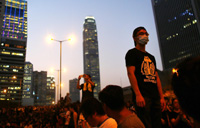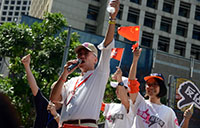The daily lives of many people in Hong Kong have been disrupted by the blockades staged by protestors in various districts — with more than 42 bus routes and some tram services suspended — as thousands of activists continue to occupy major roads in the central business area of the city.
Many banks have suspended operations in key areas of the event, including business zones of Mong Kok, Admiralty and Causeway Bay.
|
 Illegal assembly in Hong Kong leads to clashes
 HK govt calls for view expression in peaceful, lawful means |
According to the Hong Kong Monetary Authority, 44 branches, offices or ATMs of 23 banks were temporarily closed as of Monday afternoon.
The sit-ins on thoroughfares took off on Sunday afternoon, hours after the Occupy Central organizers announced a kickoff. Organizers seek to use the campaign to coerce the central and Hong Kong governments to accept their demands related to the election of the city’s chief executive by universal suffrage in 2017.
Pro-establishment legislators, in a joint statement, "resolutely" opposed any acts to siege business areas in Hong Kong. They called upon protesters to leave their locations peacefully. Workers, teachers and businesses were also urged against joining the protest.
The Hong Kong General Chamber of Commerce said it "deeply regrets" the blockades. The American Chamber of Commerce urged a de-escalation of the current tensions and encouraged a return to the usual stability on the streets.
The financial secretary, John Tsang, said the stock market, the foreign exchange market and the financial system have maintained normal operations.
The general economy remained stable the day after the event, as the government bureau and departments in charge of financial matters and institutions have activated contingency plans.
Commuters faced traffic disruptions and had to spend more time getting to work, and needy patients had extra difficulties getting to hospitals for medical appointments.
Tong Siu-fung, 60, has had problems with her feet and her doctor suggested she not walk too fast.
"But I had to walk fast. I don’t want to miss the appointment, because otherwise I will have to wait for another five months," said Tong.
"I understand that protesters have a point and they want to express their opinions. But you know who is suffering because they’re blocking the road? The poor and the sick. I think I am still young, so I can’t imagine what it would be like for patients who are older than me," she said .
Amid the protests, the Hong Kong stock market declined by 1.9 percent on Monday, continuing a three-week decline.
"The uncertainty brought by Occupy Central has caused panic selling, which has been haunting the Hong Kong equity market," said Sam Chi Yung, strategist of Delta Asia Securities.
The Hong Kong dollar eased slightly at the opening but remained generally steady. The foreign exchange market functioned normally, and there is ample liquidity in the interbank markets, Tsang said.
"The Hong Kong special administrative region, all financial regulators and financial institutions have all along put in place contingency plans to deal with various unexpected situations so as to ensure the core functions of the financial system can maintain normal operations and to minimize any impact," said Tsang.
